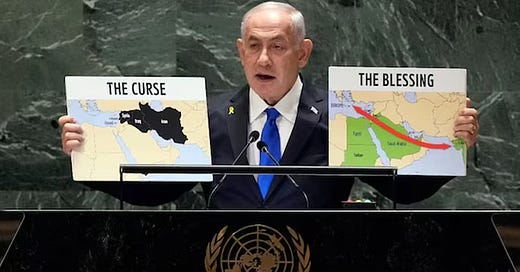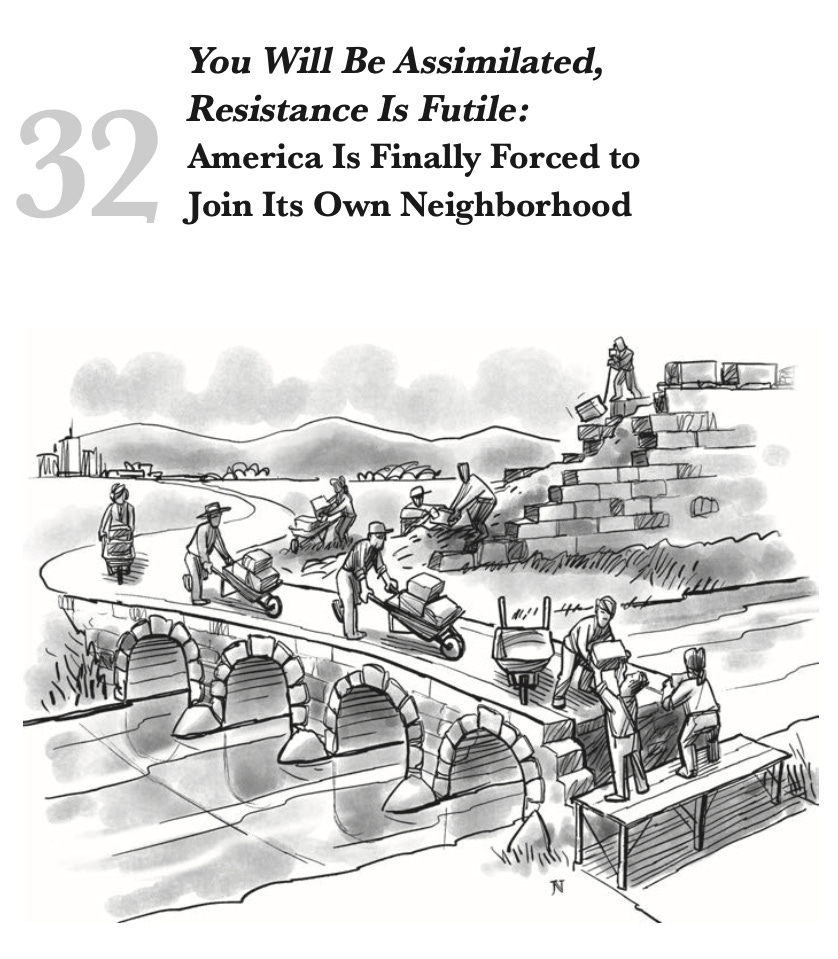[POST] Speed the killing, speed the plow
My broken record on Israel still carries the right tune
This is a reader-supported publication. I give it all away for free but could really use your support if you want me to keep doing this.
We are watching grand strategy in action. We tend to discount it because we Americans are only marginally involved (mostly as a site of performative protest) and because the idea that a small state can pursue one seems a bit fantastic.
But Israel has had such a grand strategy these past several years and is pursuing it with vigor. Yes, it is bloody and cruel but it is also very impressive and audacious.
It wasn’t that long ago that the primary fear-threat vibe in Israel was demographic in nature: Arab Israelis being calculated as outnumbering Jewish Israelis west of the Jordan River. The fear that Arab Israelis could outnumber Jewish Israelis is a powerful influence on Israeli politics and policy — despite the reality that current demographic trends and projections severely discount that outcome — if current definitions and boundaries are maintained.
Of course, we could say the same thing about Muslims in the EU, where fear also vastly outperforms realism. In the US, we could similarly note MAGA fears of being overrun by brown people from the South. Layer climate change on top of all that and you’ve got a potent mix for any democracy struggling with its identity — and isn’t that always what democracies do?
So, Israel looks around, one can imagine, and what did it see prior to October 7, 2023?
It saw a scary demographic future no matter the number of states resulting from any peace with the Palestinians. It saw Iran moving toward the bomb and showing every willingness to mobilize its Axis of Resistance to weaken and even destroy the Jewish state. It saw Persian Gulf monarchies attempting to transform themselves into modern states, becoming serious integrating economic players across the wider region and beyond (like Africa). It saw a US that was waning — in generational terms — in its support for Israel for the simple reason that America was finally recognizing the geo-strategic reality that the Gulf’s oil really belongs to Asia and not to the West.
All these fears coalesced with the Obama administration’s nuclear deal with Iran, which appeared to recognize all these realities and suggest that Washington would just as soon tie a ribbon on this whole mess and let the Saudis and Emiratis take the strategic lead.
Under those circumstances, it’s not hard to imagine Israel fearing for its future — this sense of being left behind by a 21st century history that will someday speak of the Middle East’s profound transformation as set in motion by W. Bush’s big-bang strategy on Iraq — made possible by 9/11 and the resulting Global War on Terrorism (GWOT).
Before that admittedly disastrous post-war — courtesy of the US, the Middle East had been stunningly static for decades, with the two big change vectors being population growth and booming oil wealth yielding a radical Salafi jihadist movement that threatened local and global stability (the latter primarily because the PG monarchies sought to export the problem outside the region).
Now, looking back at the early 2000s, we see that all that tumult pivoted the Middle East down a different path — one in which those godawfully rich and despicable Gulf royals finally got their act together and started building broad connectivity between their nations and the rest of the world.
Think about it: the NBA in-season Emirates Cup championship. Does ANYBODY back in 2003 have that on their Mideast bingo card?
Oh sure! A couple of decades from now, those same disgusting dictators will …
Do I credit W. Bush and his Neo-cons in any of this?
I do.
They saw decades of America doing the same things and getting the same results and nothing ever changing in the Middle East — NOTHING.
Then they toppled Saddam and blew it all up — by design.
Did a lot of death and misery ensue? That was going to happen no matter which path was taken. Hell, it had been going on for decades, yielding zero progress really for damn near everybody living there
Pre-9/11, the Middle East lagged behind globalization. Trade as a share of GDP was declining and foreign direct investment was minimal. Protectionist economic policies and high tariffs limited integration with global markets. Intra-regional trade was stunningly low at 8 percent. The Middle East’s share of world exports had dropped significantly since the 1980s, and its economies were heavily reliant on oil. Political and economic reforms were limited, and the region was largely missing out on trade-related growth.
In short, globalization was marching on without the Middle East.
Now look at the region: today it is far more economically connected, with the MENA (Middle East/North Africa) region poised to drive global growth in 2025 due to recovering oil production and investment in economic diversification. Oil-exporting countries are experiencing a rebound, and there is a push for non-oil investments and reforms to diversify economies. Yes, despite robust reform and investment, oil-importing nations are growing more slowly than before, but they’re still GROWING. Sure, geopolitical uncertainty and conflict can still disrupt economic integration, but the region is decidedly more engaged with global markets than it was two decades ago.
That was always my message: integrating any poorly-integrated region into the global economy typically comes with severe political and security tumult. That’s just the nature of the beast when modern connectivity penetrates traditional societies and CHANGES DAMN NEAR EVERYTHING from the youth-up. That’s why I called it The Pentagon’s New Map: economic frontier integration is messy, and violent, and comes with its share of ethnic cleansing.
To pretend otherwise is the true naïveté of realist foreign-policy thinkers.
Because, in the end, it all comes down to who wants to connect and who doesn’t, and those who don’t want to connect will fight the entire process tooth-and-nail.
And they will lose.
And they will driven off their lands.
And they will be orphaned within the system, the alternative being assimilation and integration.
Globalization IS the Borg on some level, and always has been.
From America’s New Map:
This is where the confluence of climate change and an ascendant global middle class creates a unique historical opportunity: climate change generates geopolitical “orphans” (non-viable states, migrants) at exactly the point when that South-centric middle class seeks maximum belonging (protection of newly acquired status and wealth). That tectonic collision of fear and hope defines this century, demanding that superpowers move beyond their strategic fixation on national defense and embrace a far more expansive definition—and delivery—of security in all its forms.
We see this race for conquering complexity among great powers’ seeking to advance AI and — on that Internet-of-Things basis — secure a stable economic future for their citizens, in addition to serving as an international tool of influence-building-and-market-capture.
That’s China with its Belt and Road, and its Smart Cities.
That’s America’s Tech Bros seeking an “industrial policy” modus vivendi with the US Government.
That’s the Persian Gulf monarchies trying to set themselves up as future AI giants.
So, understand: two-three years back, Israel feels like the future is unwelcoming to its continued existence. Basic trends are not going its way and yet the future seems brighter than ever in terms of the region’s growing global connectivity and policy reforms.
So, Israel decided to break out of the box it felt it was trapped within, and October 7 was the trolley car that eventually came down the tracks and allowed the Netanyahu government to jump aboard and — in true Godfather style — settle all family debts in one big-bang strategy of its own.
This is when the perturbed becomes the perturber.
So Israel decides to effectively liquidate Gaza as a physical environment from which threats arise. The West Bank is looking at the same dismembering future.
Israel also decides to decisively beat down the entire Axis of Resistance, with US approval and help — in addition to the acquiescence of the Gulf monarchies (all showy protests aside).
Once that was completed, the great obstacle was clear: regime-change in Iran. So long as the mullahs rule and Iran bases the bulk of its national identity in opposition to the Jewish State and the West, Israel will never be safe — as proven yet again by October 7th.
And so that’s where we are: this missile war between Iran and Israel now unfolds and will likely drag on for some time until some diplomatic understanding is achieved or the regime falls.
And, trust me, any deal Iran is forced to swallow will be tantamount to a regime-change in its profound defeatism.
Thus, Iran has no path to victory — just to diminishment.
Israel, meanwhile, has no incentive to stop, not with its Iron Dome working sufficiently to keep this an entirely unfair fight.
So, yeah, stuff will be blown up and hundreds will be killed — perhaps even thousands, but this is Israel forcing its preferred future to come into existence. The Israelis know what they want and they’re willing to fight and kill to achieve it.
Meanwhile, nobody is coming to the rescue of Hamas, Hezbollah, and the Houthis. Iran is just trying to survive at this point, in large part because NOBODY is coming to its rescue.
Why?
Because there is no future for the Islamic Republic of Iran. It doesn’t fit the glide path set by the PG monarchies. It cannot compete with Israel. It just does not fit anybody’s jigsaw puzzle of the future, and, as such, needs to go.
Understand: there will be no wider regional war. The world is fine with Israel beating down Iran because the Iranian regime — frankly — deserves it.
In foreign affairs, unlike human affairs, it is totally appropriate to kick a man when he’s down — so long as you follow that beatdown with a generous offer of follow-on trade and investment integration yielding economic development.
America got that wrong after WWI, as did Europe.
America got that right after WWII, and birthed modern globalization in the process.
Israel and the PG monarchies can get it right in a post-mullah-led Iran — if the US steps up in the right way with certain security and technology and economic guarantees.
Trump’s Nobel Peace Prize is out there, waiting to be won. The Great Resolution of the Middle East peace-problem is finally at hand.
As such, my advice to Israel remains the same: speed the killing, speed the plow.








That is some Tough Love Realpolitik there for sure. But yes, ultimately, mathematically, thermodynamically, why would he stop?